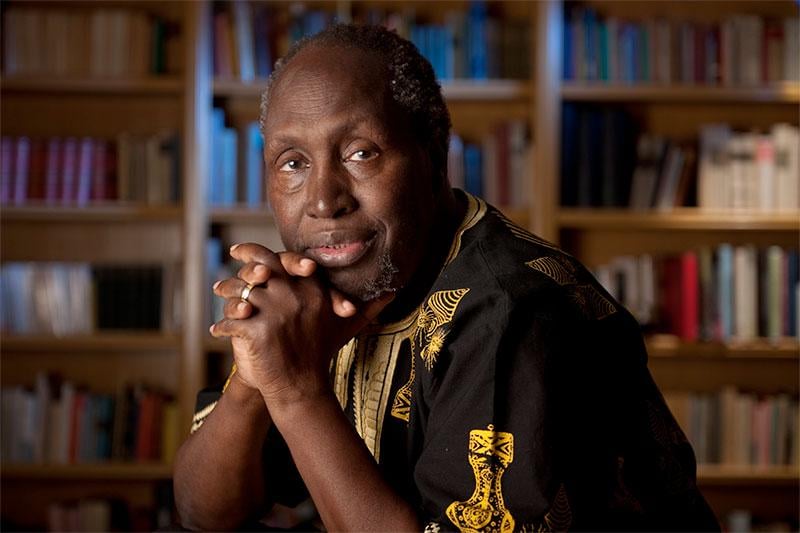Ngugi wa Thiong’o, a towering figure in African literature, has left an indelible mark on the literary landscape with his powerful storytelling and unwavering commitment to decolonizing the mind. Born James Ngugi on January 5, 1938, in Kamiriithu, Kenya, he navigated a path that would lead him to become a revered author, essayist, playwright, and literary critic. Throughout his illustrious career, Ngugi wa Thiong’o delved deep into themes of colonialism, postcolonialism, and the African experience, shaping the discourse on African identity and self-determination.
Growing up in Kenya, Ngugi wa Thiong’o was immersed in a rich cultural tapestry, nurtured by the traditions of his Kikuyu heritage. Educated at mission-run schools and later at Makerere University College in Uganda and the University of Leeds in England, he honed his craft while grappling with the complexities of a world undergoing seismic shifts. It was during this formative period that he made a significant statement by shedding his colonial moniker, James Ngugi, in favor of the more culturally resonant Ngugi wa Thiong’o, a symbolic act of resistance against the lingering vestiges of colonial influence.
Ngugi wa Thiong’o’s literary journey began its ascent with the debut of his play “The Black Hermit” in 1962, a groundbreaking work that heralded the arrival of a bold new voice in African theater. Subsequent works such as “Weep Not, Child” (1964) and “The River Between” (1965) solidified his reputation as a master storyteller, capturing the tumultuous currents of Kenya’s colonial past and the quest for independence with poignant clarity. His narratives reverberated with the echoes of the Mau Mau Uprising and the enduring struggles of a nation seeking to define its own destiny in the wake of colonial rule.
Central to Ngugi wa Thiong’o’s literary oeuvre was his unwavering advocacy for the primacy of African languages in literature, a stance that underscored his belief in the power of linguistic diversity to shape narratives and perspectives. Writing predominantly in his native Kikuyu language, he sought to amplify the voices of his people and reclaim the cultural heritage that had been marginalized by colonial impositions. His works, translated into numerous languages, served as a testament to the universality of his message and the enduring relevance of his themes across borders and generations.
Beyond the realm of literature, Ngugi wa Thiong’o was a formidable political activist, unafraid to speak truth to power in the face of oppressive regimes. His outspoken criticism of colonialism and advocacy for African self-determination led to his imprisonment in Kenya, a harrowing chapter in his life that culminated in exile first in England and later in the United States. Despite the physical distance from his homeland, his spirit remained tethered to the struggles of his people, as he continued to champion the cause of decolonization and the liberation of African minds from the shackles of mental servitude.
Ngugi wa Thiong’o’s literary legacy is enshrined in a body of work that encompasses seminal works such as “A Grain of Wheat” (1967), “Petals of Blood” (1977), and “Devil on the Cross” (1982), each a testament to his enduring commitment to truth-telling and unflinching critique of societal injustices. His magnum opus, “Decolonizing the Mind: The Politics of Language in African Literature” (1986), stands as a clarion call for the revitalization of African languages and the dismantling of linguistic hegemony that perpetuates systems of oppression.
In his later years, Ngugi wa Thiong’o continued to inspire readers with works like “Wizard of the Crow” (2006) and the acclaimed short story “The Upright Revolution: Or Why Humans Walk Upright” (2019), a transcendent piece that resonated across borders and cultures, becoming the most translated short story in the history of African writing. His literary craftsmanship, coupled with his unyielding dedication to the cause of social justice, solidified his status as a luminary in the pantheon of African intellectuals, a beacon of hope for future generations seeking to navigate the complexities of a rapidly changing world.
As news of Ngugi wa Thiong’o’s passing reverberates across the global literary community, tributes pour in from admirers and scholars alike, honoring his profound impact on the discourse of African identity and the enduring quest for freedom from oppressive structures. His life’s work stands as a testament to the power of storytelling as a tool for liberation, a mirror held up to society’s deepest wounds and a beacon of resilience in the face of adversity. Ngugi wa Thiong’o’s legacy is not merely confined to the pages of his books but lives on in the hearts and minds of all who have been touched by his visionary words, a reminder of the enduring power of literature to illuminate the path towards a more just and equitable world.
In the poignant words of Ngugi wa Thiong’o himself, “The writer can only write what he can write; the reader reads what he can read. And the dialogue that goes on between the writer and the reader across the printed page is the completion of the writer’s act of writing and the reader’s act of reading.” Today, as we reflect on his remarkable life and legacy, we are reminded of the timeless wisdom he imparted through his works, a legacy that will continue to resonate for generations to come.




Leave feedback about this